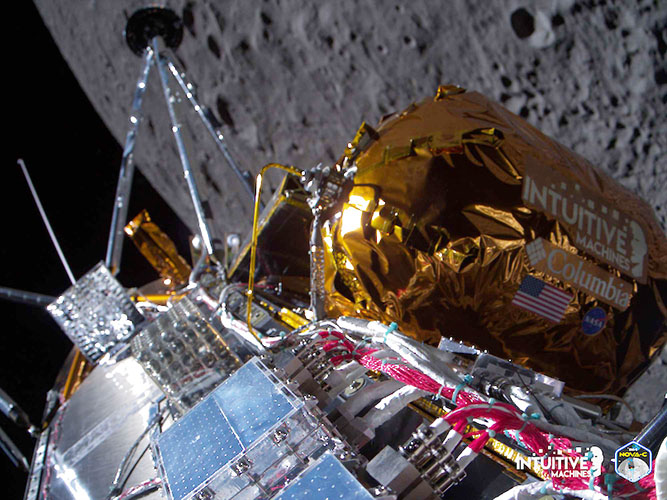Private Mission to the Moon Marks America’s First Lunar Landing Since 1972
In a milestone achievement, private company Intuitive Machines succeeded in scoring the first U.S.-backed landing on the lunar surface since Apollo 17 departed in 1972. The privately-developed lander, dubbed Odysseus, made a soft landing near the lunar south pole at 6:23 Eastern Time on February 22. The program is a part of NASA’s private-public Commercial Lunar Payload Services (CLPS) program, which also underwrote last month’s Peregrine lunar landing mission, flown by Astrobotics on a ULA Vulcan rocket. While that spacecraft launched successfully, it did not ultimately land on the Moon, with its propulsion system failing en route.
After a smooth cruise to the Moon, initiated with a launch by a SpaceX Falcon 9 rocket that left Earth on February 15, the Intuitive Machines Odysseus lander prepared to depart lunar orbit earlier on the 22nd. But that’s when the mission got exciting.
As flight controllers prepared to initiate the landing, it became clear that Odysseus’ laser rangefinders, designed to allow the spacecraft to determine its altitude and horizontal velocity, weren’t working as planned. A NASA experimental payload called NDL, a Doppler lidar laser ranging system, was pressed into service during an additional orbit, and soon a revised landing procedure was underway. This was an impressive example of quick thinking and cooperation between NASA and Intuitive Machines.
At 6:11 p.m. ET, controllers fired the braking rockets to initiate the spacecraft’s descent, and the flight center became quiet as technicians called out mission milestones. Twelve minutes later, Odysseus touched down safely.
“What a triumph! Odysseus has taken the Moon,” said NASA Administrator Bill Nelson after confirmation of a successful touchdown. “This feat is a giant leap forward for all of humanity. Stay tuned!”
Intuitive Machines Mission Director Tim Crain soon added specifics: “What we can confirm without a doubt is, our equipment is on the surface of the Moon and we are transmitting.”
The mission is not yet entirely in the clear yet, however. Expected communications from the lander did not initially reach Mission Control, and as of Thursday evening, Intuitive Machines teams were working the problem in an attempt to ascertain the operational status of the lander, which was scheduled to operate for about a week until the onset of lunar night (the Moon’s day/night cycle is roughly two weeks in duration).
This does not diminish the laudable success of the first privately designed and flown mission to the lunar surface, however.
“The successful landing of Intuitive Machines’ Odysseus on the Moon is a milestone in private-public partnerships in spaceflight,” said Dale Skran, COO of the National Space Society. “While we wish Intuitive Machines the best of luck in full operation of their lander, success has already been achieved. This new way of doing business is opening the final frontier in ways scarcely imaginable just a decade ago. Odysseus, just by landing on the Moon using a methane-liquid oxygen (LOX) engine—another first—made a giant step toward our future in space. Methane-LOX engines are key to a permanent human presence on both the Moon and on Mars.
One of the commercial payloads attached to Odysseus is an art piece created by Jeff Koons. NSS Director of Creative Arts and CEO of 4Space, Chantelle Baier, said, “It has been great working with Jeff to place this unique artwork permanently on the Moon. NSS looks forward to similar projects that will connect people to our common future in space.”
Updates on the status of the mission are expected in the coming days. NSS congratulates both Intuitive Machines and NASA for reaching this important milestone and looks forward to further public-private successes in the future.



















